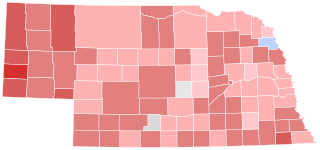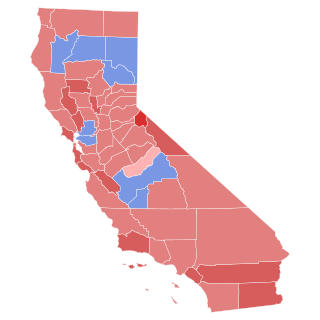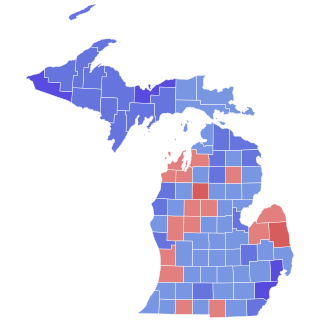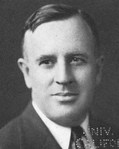
The 1952 United States Senate elections was an election for the United States Senate which coincided with the election of Dwight D. Eisenhower to the presidency by a large margin. The 32 Senate seats of Class 1 were contested in regular elections, and three special elections were held to fill vacancies. The Republicans took control of the Senate by managing to make a net gain of two seats. However, Wayne Morse (R-OR) became an independent forcing Republicans to rely on Vice President Richard Nixon's tie-breaking vote, although Republicans maintained a 48–47–1 plurality. Wayne Morse would caucus with the Republicans at the start of Congress’ second session on January 6, 1954 to allow the GOP to remain in control of the Senate. This was the third time, as well as second consecutive, in which a sitting Senate leader lost his seat.

The 1916 United States Senate elections were elections that coincided with the re-election of President Woodrow Wilson. This was the first election since the enactment of the Seventeenth Amendment that all 32 Class 1 senators were selected by direct or popular elections instead of state legislatures. Republicans gained a net of two seats from the Democrats, and then an additional two seats through mid-term vacancies thereby reducing Democrats to a 52–44 majority.

The 1994 United States Senate election in Michigan was held November 8, 1994. Incumbent Democratic Senator Don Riegle decided not run for re-election. Spencer Abraham won the open seat, becoming the first and so far only Republican to win a U.S. Senate race in Michigan since Robert P. Griffin in 1972 and the first to win the state's Class I seat since Charles E. Potter in 1952. As of 2024, this is the last time that a man won the Class 1 Senate seat in Michigan, and the last time in general that a Republican was elected to a U.S. Senate seat in Michigan.

The 1978 United States Senate election in Michigan was held on November 7, 1978. Incumbent Republican U.S. Senator Robert P. Griffin ran for re-election to a third term, but was defeated by the Democratic candidate, Detroit City Council President Carl Levin.

The 1976 United States Senate election in Michigan took place on November 2, 1976. Incumbent Democratic U.S. Senator Philip Hart decided to retire instead of seeking a fourth term because he had terminal cancer. Republican turned Democrat Representative Donald Riegle won the open seat, keeping it in Democrats' hands despite Gerald Ford's victory in the concurrent presidential election.

The 1942 United States Senate election in Iowa took place on November 3, 1942. Incumbent Democratic Senator Clyde Herring ran for re-election to a second term but was defeated by Republican Governor George A. Wilson.

The 1942 United States Senate election in Nebraska was held on November 3, 1942.

The 1940 United States Senate election in Ohio took place on November 5, 1940. Incumbent Democratic Senator Vic Donahey did not run for re-election to a second term. In the open race to succeed him, Republican Mayor of Cleveland Harold Hitz Burton defeated Democratic U.S. Representative John McSweeney.

The 1982 United States Senate election in Ohio took place on November 2, 1982. Incumbent Democratic U.S. Senator Howard Metzenbaum was re-elected to a second term in office, defeating Republican State Senator Paul Pfeifer. Along with the gubernatorial election that same year, this election is the last time Butler County voted Democratic in a statewide election.

The 1948 United States Senate election in Michigan was held on November 2, 1948. Incumbent Republican U.S. Senator Homer S. Ferguson was re-elected to a second term in office over U.S. Representative Frank E. Hook.

The 1942 United States Senate election in New Hampshire took place on November 3, 1942. Incumbent Republican Senator Styles Bridges won re-election to a second term in office, defeating Democratic former Governor Francis P. Murphy.

The 1942 United States Senate election in Mississippi was held on November 3, 1942. Incumbent Democratic U.S. Senator Wall Doxey, who had won a special election the year prior to complete the unexpired term of Pat Harrison, ran for a full term in office. He was defeated by James Eastland who was appointed to and held the seat prior to Doxey's wins.

The 1952 United States Senate election in Michigan was held on November 4, 1952 alongside a special election to the same seat.

The 1936 United States Senate election in Michigan was held on November 3, 1936. Incumbent Republican U.S. Senator James J. Couzens ran for re-election to a third term in office, but was defeated in the Republican primary by Governor Wilber Brucker. Brucker was defeated in the general election by Democratic U.S. Representative Prentiss M. Brown, becoming the first Democrat to win this seat since 1853.

The two 1946 United States Senate elections in California were held concurrently on November 5, 1946.

The 1954 United States Senate election in Michigan was held on November 2, 1954. Incumbent Republican U.S. Senator Homer S. Ferguson ran for re-election to a third term, but was defeated by the Democratic Detroit Board of Education member Patrick V. McNamara.

The 1960 United States Senate election in Michigan was held on November 8, 1960. Incumbent Democratic U.S. Senator Patrick McNamara was re-elected to a second term in office, defeating U.S. Representative Alvin M. Bentley.

The 1964 United States Senate election in Michigan took place on November 3, 1964. Incumbent Democratic U.S. Senator Philip Hart was re-elected to a second term in office over Republican Elly Peterson.

The 1966 United States Senate election in Michigan was held on November 7, 1966. Incumbent Republican U.S. Senator Robert P. Griffin, who had been appointed to the seat in May to fill the vacancy left by the death of Patrick V. McNamara, was re-elected to a full term in office. Griffin defeated Democratic former Governor G. Mennen Williams in the regularly scheduled election, as well as the concurrent special election to complete McNamara's unfinished term.

The 1982 United States Senate election in Michigan took place on November 2, 1982. Incumbent Democratic U.S. Senator Don Riegle was re-elected to a second term in office, defeating Republican U.S. Representative Philip Ruppe.























